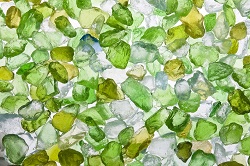New optical sorter improves glass recycling
Driven by the latest EU legislation and fiscal measures, there is a growing desire to increase the amount of glass that is recycled. Kerbside collections of glass are common practice throughout Europe but residents continue to mix unwanted glass with organic waste, despite local authority efforts to explain waste collection practices. The EU-funded Horizon 2020 SEEGLASS project has responded to this challenge by recovering glass directly from mechanical and biological treatment (MBT) plants treating municipal solid waste (MSW). Researchers began by designing and manufacturing a new machine-vision optical sorter, integrating it at the end of a fully-equipped glass sorting process line. “Glass as a marketable product is recovered at rate of 85 % of the total quantified glass contained in the waste, with 99 % glass purity and less than 1 % of ceramic, stone and porcelain impurities,” says project coordinator Luis Segui. A full-scale demonstration facility near Barcelona comprehensively tested a wide-range of feedstocks. “These included residues from the mechanical phase of MBT processes, the rejects of compost refining, incineration bottom-ashes, household waste, commingled waste and the remains of end-of-life vehicles,” describes Segui. “SEEGLASS provides new streams of reclaimed glass that would otherwise not be recovered and sent to landfills.” Visionary user-friendly system Based on modular units, the SEEGLASS process line is quick and easy to install and simple to operate. “Shaking separates the waste particles by size, shape and density, before machine vision sorts them further according to their main components or colours. The detected materials are then selectively ejected from the material flow into a separation chamber by high-precision jets of pressurised air,” explains Segui. The project also developed new optical sorting software incorporating datamining processes and industry 4.0 applications for material sorting and recycling. Industry 4.0 is the current trend of automation and data exchange in manufacturing technologies to create ‘smart factories’. Researchers processed large amounts of visual and operational data for performance analysis of the optical sorting process, including plant management applications and internalised problem-prevention controls. Development of real-time visualisations and operator interfaces for local and remote operation, like touch-screens, mobile phones and tablets, enabled rapid and intuitive equipment configuration and monitoring. Other new features also incorporate throughput analysis, continuous auto-diagnosis and alarm handling. Increased glass recycling helps economy and environment The SEEGLASS solution provides high recycling rates and contributes to the development of circular-economy strategies for communities concerned about their waste management. According to Segui: “Waste management and recycling companies can sell the reclaimed glass and recyclables, and consequently reduce landfill or incineration costs, increasing their facilities’ throughputs.” Potential customers benefiting from the SEEGLASS solution are mainly local authorities and private waste management companies operating MBT plants, as well as material recovery facilities of waste issued from MSW. “Potential clients are currently asking for quotations for both the process line and optical sorters for glass recovery from a wide range of wastes,” Segui concludes.







